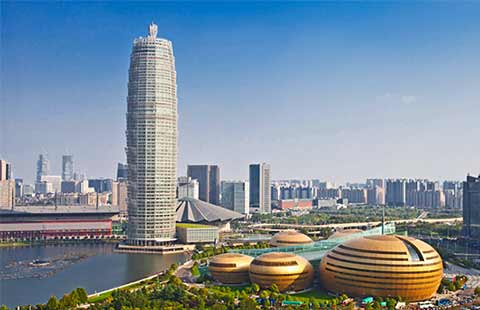State-owned companies brace for major reforms
By LYU CHANG (China Daily) Updated: 2016-02-26 07:27

Measures aimed at streamlining the running of SOEs
China's top State-owned asset administrator said on Thursday it will pick three to five companies this year for a pilot program to better manage government assets.
Two companies, China Chengtong Holdings Group Ltd and China Reform Holdings Corp Ltd, are already being reorganized into State-owned asset-operating firms, said Zhang Xiwu, deputy head of the State-owned Assets Supervision and Administration Commission of the State Council.
He said this year's priority will be setting up or restructuring companies that invest and operate State-owned assets, and this will strengthen their overall management.
The reforms aim to "explore new State-owned asset management models focused on the management of the capital rather than the companies, find effective means for a mixed-ownership economy and improve corporate governance structure".
China Chengtong and China Reform declined to comment.
Major businesses of China Chengtong include assets management, logistics service, capital goods trade as well as forestry, pulp and paper products. China Reform, a capital-operating company backed by SASAC, was founded in 2010 to fuel the integration of State-owned enterprises.
China Chengtong, which owns more than 100 subsidiaries, also has businesses in tourism, cultural and packaging industries.
"Actually, China Reform Holding Corporation has been running this business for sometime, and there are other similar investment platforms as well. So, the question is whether this can lead to more autonomy into businesses and make their management more efficient," Oliver Barron, head of research for the London-based investment bank NSBO, told China Daily.
He said the pilot will very likely be on Singapore's Temasek, the country's state investor, which was created as a state asset manager.
"Though government-owned, Temasek is the major shareholder in the companies, the management can run the state companies in the best way it can without the government's direct intervention," Barron said in Beijing.
The reform of introducing a State asset manager is only part of a new round of reforms of State-owned enterprises, testing changes that will affect mergers, salaries, employee shareholding and mixed ownership, as the country is seeking ways to drive up the economy.
- Beijing restaurant offers model for SOEs' reform
- Third of listed centrally owned SOEs predict losses in 2015
- Suggestions on Promoting Overall Listing of SOEs --Views on Shanghai’s Experience for SOEs’ Overall Listing Reform
- SOEs should cooperate more with Internet companies: Liu Liehong
- China to launch 10 pilot reforms for SOEs in 2016
- China to promote service trade innovation in pilot areas
- China-Germany economic cooperation in good momentum: Chinese Commerce Minister
- China's rural residents enjoy better healthcare
- Banks to be get more leeway in mortgage pricing, risk valuation
- Central bank continues fund injection
- Central bank governor plays down forex fluctuation
- New thinking boosts economic growth quality
- Family doctors the future of China's healthcare system
















